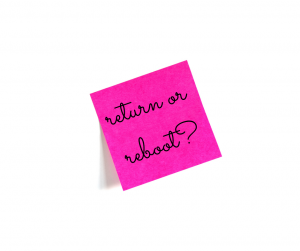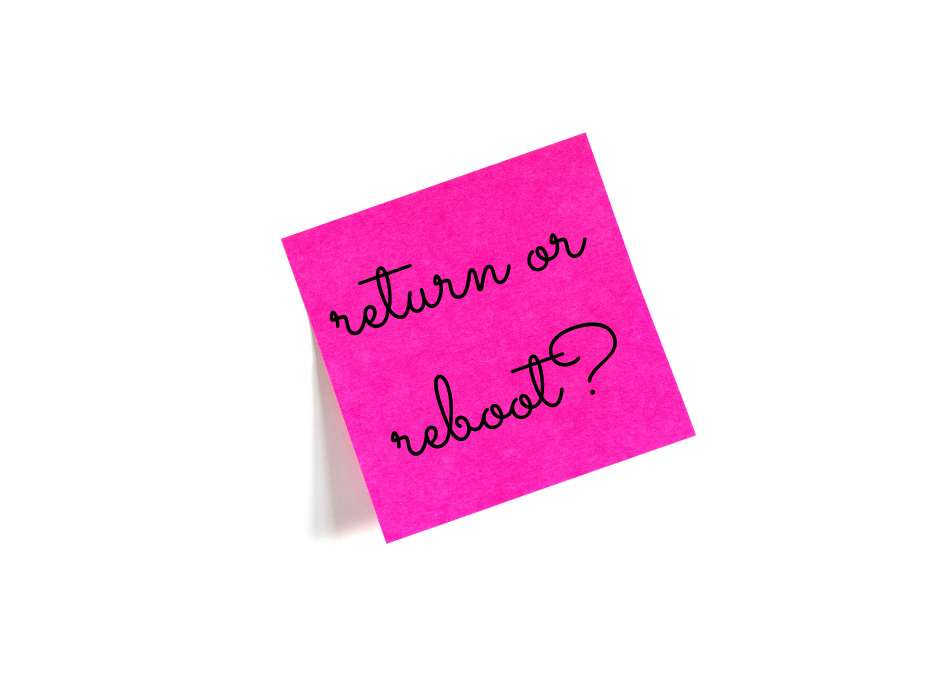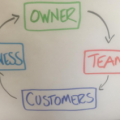Re-imagining my work
 People are beginning to make their way back into their offices or consider what working life is going to be like now that restrictions have eased.
People are beginning to make their way back into their offices or consider what working life is going to be like now that restrictions have eased.
Some may have just completed their first or second week back in the office – what has it been like for you? How have you been feeling and what are you missing from “lockdown” and working from home?
Returning to work or rebooting?
Notice the language being used within your business – are leaders talking about returning or are they talking about rebooting? What’s the difference and what does it mean for everyone in the workforce?
If we are returning then we are going back into what was………..we are coming back to the old status quo before we went off to work remotely at home.
If we are rebooting then we are making a new start or creating a new version from what we left behind and what we experienced during the lock down.
We choose rebooting
We choose rebooting where you take the new version of self into the workplace. Do this and you open the doors for re-imagining the future of work – you look for ways to integrate the changes you experienced into the possible future ways of working.
In the pace and stress of navigating change, our focus is often primarily on business outcomes, making things happen, getting stuff done and proving we are valuable members of the team who have continued to be productive. To enable rebooting we need to step back and take time and invest energy into personal reflection.
Take time and invest energy into reflective thinking
Taking time and investing energy into personal reflection can feel like a luxury, rather than a necessity. Yet reflective thinking is critical if leaders and organisations are serious about being adaptive, resilient, and creative. We encourage everyone to take the time and invest the energy into reflective thinking about the change you have experienced, and how you personally transitioned through this change in such a short time period. As William Bridges has described so beautifully –
It isn’t the changes that do you in, it’s the transitions. Change is not the same as transition. Change is situational – it’s the new structure, the new policy, the new role, the new virus etc. Transition is the psychological process people go through to come to terms with the new situation. Change is external, transition is internal.
What kind of transition did you go through?
What kind of thinking did you undertake as you set yourself up to work from home:
- What worried or scared you and how did you overcome this?
- What frustrated or annoyed you and what did you do to process this?
- What did you find yourself being grateful for?
- What was great about working from home?
- What has excited you about working from the office again?
- What didn’t work so well for you while working from home?
- What did you really enjoy and would love to hold on to from when you were working at home?
- What are you planning to change in the way you turn up in the future?
In my experience we work at such a pace too few of us take the time to sit and reflect so we can learn and alter the current status quo. Rather we just keep “doing” – getting things done, ticking off our “to do lists” and sticking to our plan. We can all benefit from making the time to be conscious of what we have achieved, what has worked and how have we felt.
This is particularly important when you consider the words of Christine Gross-Loh:
“Our lives are messy, our actions are messy and our personalities are certainly messy”.
Now, the best way to navigate our way through the messiness is to take time out and assess where we are, how we got there and how we want to continue moving in an expansive and inspirational way rather than a constrained and fearful way.
Now is a good time to get yourself into the habit of reflecting – try it out and let me know how you go!
Re-imagining is only possible after reflection
We strongly believe in the importance of re-imagining our future way of working and we are also confident this can only happen after each person has undertaken some personal reflective thinking and then brings it courageously to the team in a purpose filled conversation to explore the possibilities.
Want to know how you can do this? Contact us – we have “conversations in a box” – having done all the hard thinking, designed some great questions and developed pre-reading that can easily be sent out to team members to enable such purpose filled conversations.









